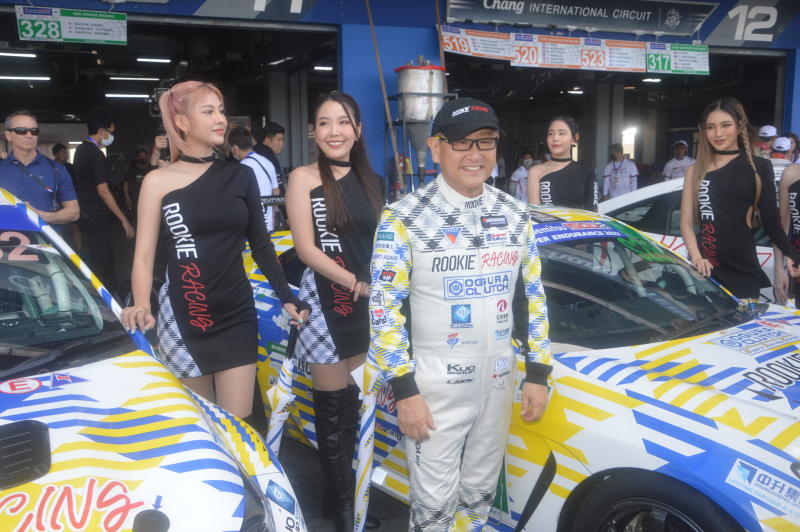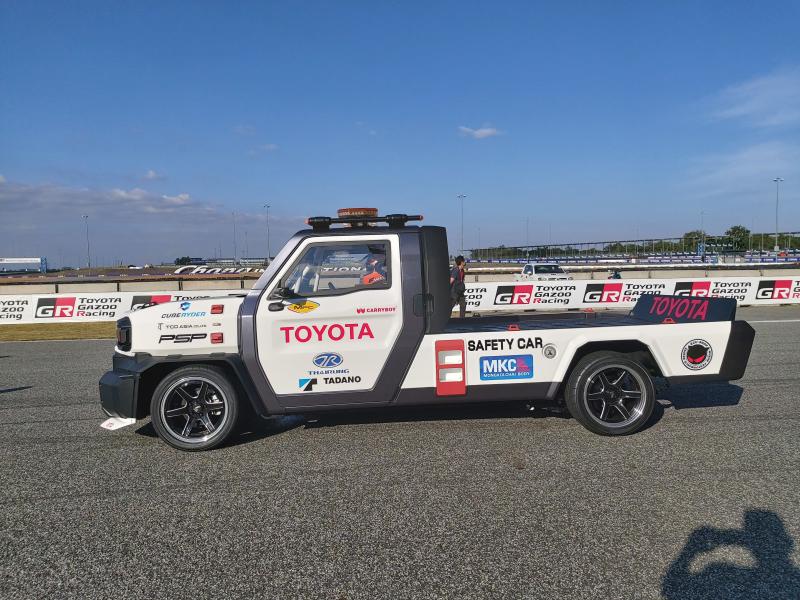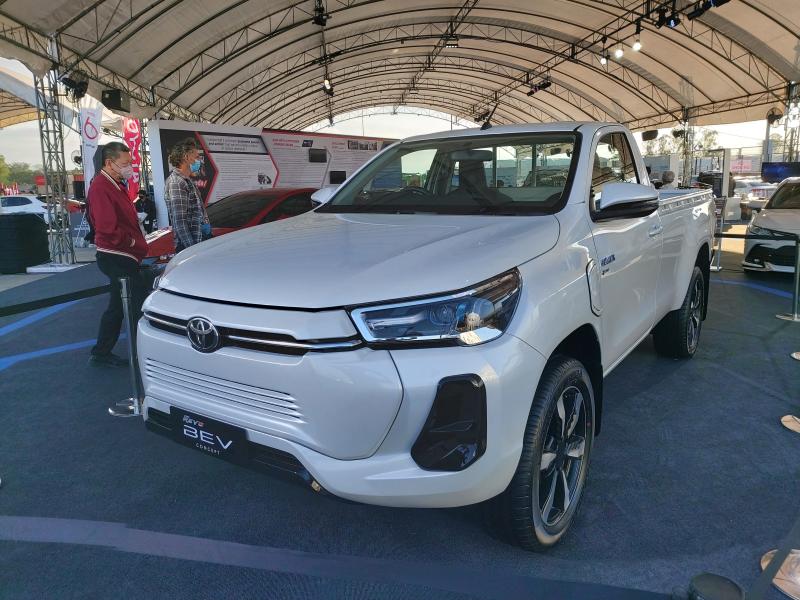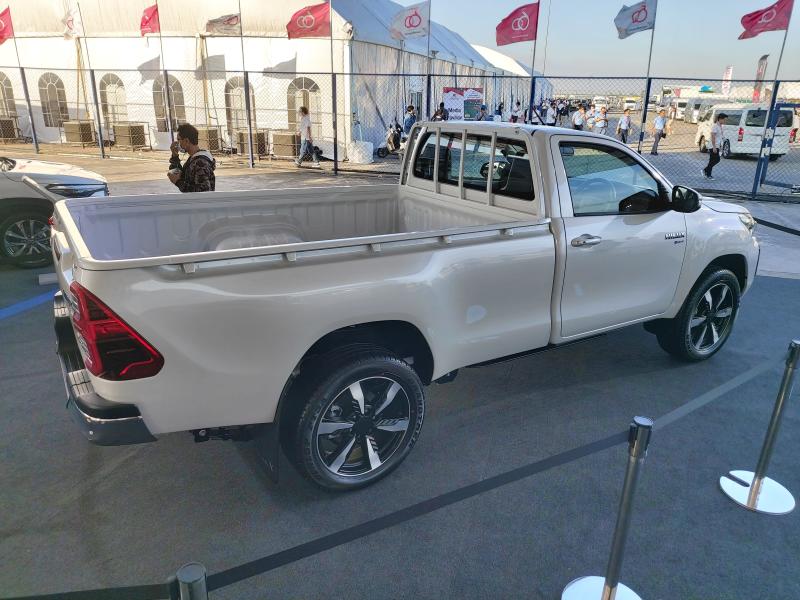BANGKOK: Battery electric vehicles (BEVs) are not the only way to achieve a carbon neutral future, and hydrogen or synthetic fuel-powered cars could be better choices in slowing down climate change.
That was what Toyota Motor Corp (TMC) president Akio Toyoda wanted to demonstrate at last month's Idemitsu 1500 Super Endurance race at the Chang International Circuit in Buri Ram, Thailand.
The race saw spectators thrilled by Toyoda and his Rookie Racing privateer team who showcased the prowess of a hydrogen-powered GR Corolla H2 as well as a synthetic fuel-powered GR86.
Toyota Gazoo Racing Team Thailand also joined the “Carbon Neutral Power Cup” special category with a synthetic fuel-powered GR86, and finished in the first place (443 laps).

Toyoda with the race cars.
Rookie Racing's GR86 was the runner-up (230 laps), followed by the GR Corolla H2 (152 laps).
Toyoda's purpose was to test the alternative fuelled cars outside Japan, with the support of Thai partners such as BIG (Bangkok Industrial Gas), which provided trucking solutions and hydrogen for the race.
Earlier in June last year, both cars had completed the Super Taikyu Fuji 24 Hours race at Fuji International Speedway, marking a year since the hydrogen-powered Corolla's first race in 2021.
And the results at Fuji were promising.

GR Corolla H2 (left) and GR86 (centre) thrilling spectators.
Compared to its first race, the GR Corolla H2 delivered 24% and 33% higher power output and torque respectively, and 30% longer driving range.
Hydrogen refuelling time was also reduced by 70% (5 minutes to 1.5 minutes).
These race cars are due to TMC's vision of regular cars with internal combustion engines that run on hydrogen or synthetic fuels - derived from renewable energy sources.
There are no fuel cell stack or lithium-ion battery here, or electric motors found in EVs.

Corolla Cross H2.
To showcase the fun of driving such cars, the motoring press were given brief taxi rides in a Toyota Corolla Cross H2 at a reserved area at the circuit, laid out with a long runway for straight off-the-line sprints, a short slalom exercise and an irregular surfaced section.
The Corolla Cross H2 has a 1.6-litre turbocharged three-cylinder engine with direct injection, and with very minor modifications, it is powered by hydrogen gas stored in two tanks.
With a manual transmission, the Corolla Cross H2 delivered quick sprints and the expected thrills, engaging exhaust notes of a powerful and exciting, fun-to-drive turbocharged combustion engined sports car, instead of a soul-less smartphone on wheels.
"Many people in Japan associate hydrogen with explosions. I want to show that it is safe by driving in a race myself," stated Toyoda, adding that there are multiple paths toward achieving carbon neutrality.

Corolla Cross H2.
"If we pursue BEVs as the only option to reach carbon neutrality, it would eliminate many jobs in the automotive industry."
Toyoda explained that to speed up the process of mastering hydrogen powered engine technology, motorsports is a key approach.
"Going straight into a 24-hour race brings all the problems to the surface and forces us to fix them for the next race," he stated.
The hydrogen-powered engine uses hydrogen instead of petrol, and emits almost no carbon dioxide (CO2) - aside from a little engine oil burned during driving.

IMV 0.
The endurance race also saw the new Toyota IMV 0 concept pick-up truck doing duty as a safety car.
The IMV 0 concept was previewed during the 60th anniversary celebrations of Toyota Motor Thailand Co Ltd (TMT) in Bangkok.
While the majority of concept vehicles never make it to production, the IMV 0 concept is likely to be among the exceptions.
Toyoda had said the IMV 0's official launch is over a year from now, and he had challenged TMC's engineering and design teams to create a brand new IMV pick-up truck for Thailand, "something truly affordable and innovative."

IMV 0.
"This is a product that can enhance the quality of life for many people and provide new economic opportunities," he said.
"At Toyota, we believe in building cars to serve the real-life needs of our customers. That is why our IMV 0 team spent many months in the field, observing the lifestyles and needs of our potential owners," said Toyoda.
In a video presentation, Toyota engineers said the IMV 0 is aimed at becoming a national and beloved pick-up truck in Thailand, with "most affordable price tags."

Revo BEV.
The IMV 0 is designed to be highly modular, versatile and comes with various customisation options for multiple applications such as a food truck or logistics.
Toyota engineers had said the IMV 0 is "like a blank canvas" that owners would paint and colour, and use to "make money".
While no powertrain details were announced for the IMV 0, Toyoda did stress that the automaker does not take a one-size-fits-all approach to its products or powertrains.
Also on display at the circuit was the all-electric Hilux Revo BEV concept.

Revo BEV.
Toyoda pointed out, "We need to be realistic about when society will be able to fully adopt BEVs and when our infrastructure can support them at scale. Personally, I would rather pursue every option, not just one - such as emission-free synthetic fuels and hydrogen.
"We need to take a holistic approach to carbon neutrality, from how we source materials, to how we manufacture cars, to what powertrains we put in them, and how we dispose of them.
"We must remember that carbon is the real enemy, not a particular powertrain," he said.












